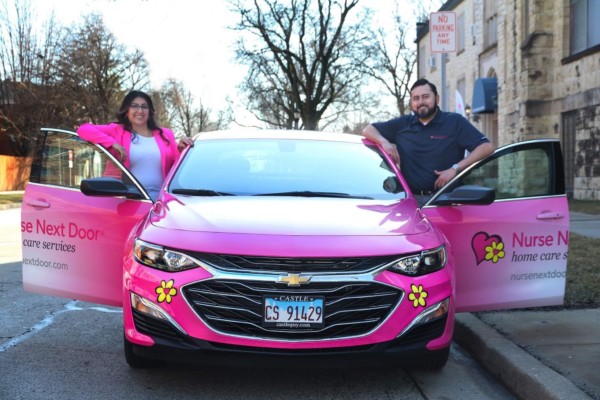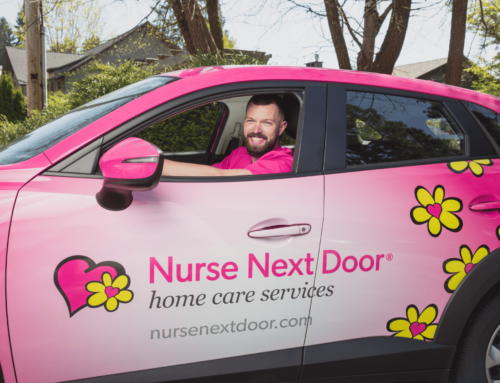Entrepreneurs have many factors to consider when deciding between either buying a franchise or starting a business from scratch.
While there’s no right or wrong answer, your choice will largely depend on what kind of business owner you want to be.
To help you decide between buying a franchise vs. your own business, we’ve broken down the six main differences between the independent business model and the franchising business model.
Owning a Franchise vs. Owning an Independent Business
1. Branding
Franchise Business
By buying a franchise, you gain access to existing brand recognition from the very start. This recognition can help you attain customers as soon as you open the doors.
The problem business owners encounter is that customers these days have so many options to choose from when deciding what product or service to buy. Ultimately, their decision is due to several factors; however, brand recognition is one of the main factors.
A brand they recognize and trust versus one they’ve never heard of can be the overarching deciding factor in their purchasing decision.
This is due to the concept called ‘know, like and trust,’ which says customers “will do business with you if they know you, like you, and trust you.”
So, as a business owner, be careful when choosing a franchise as your next business. Check the franchise’s reputation closely, find out how satisfied their current customers are and how long they’ve been operating as a franchise business. Remember, not all franchises are created equal.
For example, many prospective franchisees choose Nurse Next Door, as we’ve been around for 20 years—enough time to prove ourselves as franchise experts and a premium service provider in the home healthcare services industry.
Home health care is a competitive space, and you need to stand out to succeed. When it comes to Nurse Next Door, it’s hard to miss the bright-pink signage, vehicles, and communication materials. We stand out in a sea of clinical, drab senior care competitors, and our branding reflects our unique values and our core purpose of helping every client experience Happier Aging™.
Own Business
On the other side of the spectrum, when you have your own business, you can set the tone for your company’s branding exactly how you want to.
For some entrepreneurs, this is the only way they see fit.
Creating your own branding can be an advantage, but only when you know you have a clear brand idea and have conducted thorough market and brand research to see if it receives a positive customer response.
The trouble with this is that it takes time to conduct research to see if your prospective business opportunity will be a success. To do this, you need to create surveys, receive customer feedback, and ask friends, family, and others to review your branding. However, if you don’t do this, your great branding ideas may not be received by your target audience as you hoped.
That doesn’t mean all is lost!
You can tweak the branding after launching your small business, but this can take time and be costly.
2. Operations & Systems
Franchise Business
This brings us to our next point. Well-established franchises have stood the test of time for a reason. They’ve built a proven business model through tested systems and processes that can scale beyond their original business.
New franchisees receive an existing business formula that has been tried and tested, with the potential kinks ironed out before you even onboard your first client.
This can be very appealing to new business owners, who might have trouble juggling everything that comes with starting a business from scratch. Having a prescribed system from a parent company or franchisor can help streamline business tasks so you can focus on the day-to-day operations of your franchise.
Of course, you can’t rely on a franchisor’s proven track record alone. You’ll still need to be prepared to work hard hours and have the self-discipline and motivation to see your franchise succeed. Franchises give you the blueprint, but it’s up to you to build the house.
Own Business
Having access to existing systems and operations is great for owners who are more interested in making money than the journey to profitability.
But it won’t suit a business owner who has fresh business ideas and wants to express those freely by having them tested in the market.
Think about Steve Jobs.
He didn’t decide to go into franchising and sell a product or service that had been sold before. Instead, he envisioned new products that didn’t even exist in the market: the iPod and the iPhone.
He took on far more risk, but his products gained worldwide success in the end.
Not everyone will be the next Steve Jobs, but starting your own business might be the way to go if you have an idea for a new product or service.
The negative of this is that it takes time to set up these operational processes.
Most franchises have tweaked and tested their formula, allowing any new business owner to easily adopt these processes and see their business grow more quickly than new start-ups.
This is where you’ll have to decide how much risk tolerance you have. If you are risk averse, using a proven system that a franchise model can offer may be your better-suited business model.
3. Sales & Marketing
Franchise Business
Franchisors have worked for years to create and test communications, marketing, and advertising strategies.
The parent company’s franchise experts will know which channels will work in your area, understand the customer base, and can help ease the learning curve. They have the long-term data and analytics you need to grow your franchise business, so you don’t have to spend time on tedious admin, data analysis, and reporting.
Proven marketing formulas and on-hand sales team support can save ample amounts of time for your new company.
Take Nurse Next Door, for example. We give our franchisees access to the Care Services Center: a resource of customer service staff who takes customer inquiry calls and schedule appointments, and help find clients for you.
Own Business
When you’re an owner of a small business, you are in charge of the sales, marketing, and advertising strategies.
Keeping on top of this may seem daunting, but having the freedom to create your own marketing messages can be of greater value to you if you’re an entrepreneur who likes to test new ideas and experiment with small business trends.
This could mean making cold phone calls, setting up your social media marketing, writing and designing printed leaflets, updating a blog, or investing in digital advertisements. It takes a lot of time and effort to advertise successfully, and you won’t know if your marketing plans will hit the mark until after they’ve been rolled out.
Owning a franchise means you don’t have to spend hours choosing the right font or approving ad copy; the marketing is already there and ready to go.
The downside, however, is less buying power when it comes to advertising and marketing costs. Without the reach of a large franchise, your carefully-crafted marketing messages may not reach a wider audience.
4. Products & Services
Franchise Business
In franchising, the parent company continually improves products and services through years of trial and error.
Franchisors will generally test new products or services at company-owned locations or with franchisees willing to test them.
The benefit of this is that when the time comes to roll out new products or services to the greater market across the franchise locations, the product/service has already been tested—taking the risk away from the franchisees by not having to market test on their own dime.
Own Business
The same process of rolling out new products or services goes for small business owners. However, they don’t usually have the luxury to test new products or services the way franchises can.
To test whether a new product will do well or not, small business owners must test it in an existing or new market with their own time and money.
While this can be exciting, as it could very well be a hit, it also comes with a loftier risk of losing precious money and time.
However, high risk can equal high reward! At the end of the day, it comes down to how risk averse you are or not as an entrepreneur.
5. Financials
Franchise Business
When you buy into a franchise, there are some initial investment costs to consider. Many franchisors expect new franchisees to sign a Franchise Disclosure Document (FDD) outlining expected costs.
Generally, you pay an initial franchise fee and a licensing fee, as well as ongoing fees, monthly fees, or royalty fees. This standard practice in franchise law shouldn’t discourage you from joining the franchise business world.
The initial investment covers the cost of the franchise system, such as branding, marketing, and customer service support the franchise provides as you grow your business. These costs will vary depending on which type of franchise you choose.
For example, Nurse Next Door’s minimum investment is approximately $100,000, but you can get started with as little as $30,000 down.
Own Business
Most people know that you usually have to spend money to make money, but with independent business ownership, it doesn’t always have to be the case.
If you have entrepreneurial dreams but not a budget, there are ways to start making money and growing a business without needing an initial financial cushion.
Unlike franchises, you can start your business as a side hustle while you remain employed. Then when it’s financially feasible, you can quit your salaried position to go all in on your own startup.
For instance, you can provide a consulting, accounting, or graphic design service; then, you can set up an office at home, allowing you to save on renting space.
Or, if you have a talent for landscaping, you can create a website, start marketing and gain customers all from home. Since you’d be offering services from people’s homes, you won’t need to pay for a fully operational location.
While there are a lot of opportunities for starting your own business, it can be difficult to grow as big as a franchise and at the same speed without access to established support provided by a franchise company.
However, for some entrepreneurs, the benefits of operating their own small business can add other intrinsic values that money cannot provide, such as the feeling of freedom and joy of running your own successful business.
6. Business Support
Franchise Business
As an independent small business owner, you get used to wearing many hats. However, things can quickly get overwhelming if you don’t have a team to support you. This is where the franchising business model comes into play vs. running your own business.
Franchisors have a stake in your company, so they’re motivated to support your success because it’s their success too.
For this reason, many franchises have developed training programs and ongoing support systems to ensure you have the knowledge and resources to run a profitable franchise.
At Nurse Next Door, 24/7 support comes standard. We provide unlimited access to our Care Services Center, a centralized scheduling team that handles calls and inquiries daily and manages client visits. This helps franchisees get out from behind their desks and into the community.
On top of this, franchisees have access to other peers through events that let franchisees connect and share the highs and lows with like-minded franchisees.
Own Business
If you have the lone wolf personality that many entrepreneurs have of wanting to figure it all out on your own, then the franchise business model may not be for you.
Some entrepreneurs prefer not to rely on others for support or guidance as it can feel more like a hindrance than helpful when you already have the existing entrepreneurial experience to run a successful business.
Franchise owners may have a recognizable brand on their side, but they don’t have a lot of say over the business strategies.
Starting your own business means you are your own boss, meaning you have more control over every aspect. You have the freedom (and responsibility) to decide exactly how it looks, what your employees wear, where you’re located, and everything else.
The Bottom Line
There are significant differences in each business model, so the ultimate decision rests on your personal preferences and vision of running a company.
Franchises offer instant brand awareness, marketing and sales support, and a network of other franchisees. But they have rules you have to follow and fees you have to pay.
On the other hand, owning your own business and starting from the ground up gives you complete control over your product and the flexibility to innovate when needed. However, this route lacks the support and economies of scale that a franchise can offer.
Ultimately, the type of business you want to run depends on the kind of business owner you want to be.
If you’ve read this far and are looking for a proven, successful franchise model, then look into Nurse Next Door may be the perfect fit for you.
Want to find out if you have what it takes to run a home health care business? If so, a representative at Nurse Next Door will be happy to help you!
Call 1-855-737-6803 today or request a Welcome Package.
Access Your Welcome Package which includes
- Discovery Video – 15 min overview of this opportunity
- Franchisee Testimonials
- The Nurse Next Door opportunity
- Access to our calendar to book a 1×1 call.

 x
x







